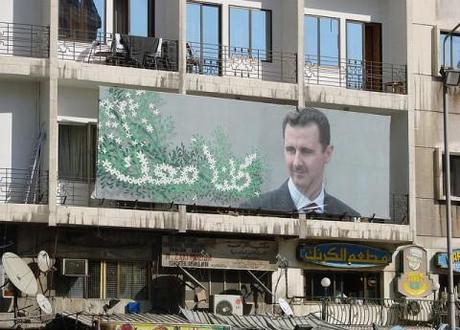
The al-Assad regime's actions are deplorable; but the US's hypocritical in its criticism of China and Russia for vetoing a UNSC resolution condemning it. Photocredit: watchsmart
On Saturday, 4th February, China and Russia vetoed a UN Security Council (UNSC) draft-resolution that condemned the Syrian government’s brutal crackdown on anti-government protesters and called for a “political transition to a democratic, plural political system”.
China and Russia’s decision to wield their permanent member vetoes has been widely criticised. The outrage at this decision was most pronounced amongst the western powers, particularly in the US. The US secretary of State Hillary Clinton denounced the double veto as a “travesty”, claiming that Russia and China now ‘bear full responsibility for protecting the brutal machine in Damascus’.
Assad’s actions are deplorable. Syrian human rights NGOs estimate the death toll of anti-regime protesters to have reached 7,000 since protests erupted in in March 2011. The UN stopped estimating the death toll in January after it passed 5,400, due to difficulties in confirming figures.
Of course, the international community must condemn the Assad’s regime, as indeed they should any government who turn upon their own people with such devastating brutality. However, the stench of hypocrisy running through Clinton’s words is nothing short of nauseating.
The US have consistently and unabashedly used their veto as a tool with which to push their own agenda and those of their closest allies.
The US have consistently and unabashedly used their veto as a tool with which to push their own agenda and those of their closest allies. Since 1972 the US have been by far the most frequent employer of the UNSC veto, often in direct opposition to the international consensus. Indeed, as recently as February 2011, the US used their veto to block a draft security council resolution condemning illegal Israeli settlements in the West Bank, despite the fact that the resolution had support from all 14 of the other security council members.
I address this hypocrisy neither to defend the Russian-Chinese veto – their actions were patently driven by cynical self-interest – nor specifically to attack the US. Rather, I highlight this contradiction to reaffirm the urgent need for UNSC structural reform.
The UNSC was formed in the immediate aftermath of World War II to address the precarious bipolar international power balance of the era. Permanent council seats were given to the key global powers of the time: The US, UK, France, Russia and China (the P5), each of whom were bestowed with the right to veto proposed council resolutions.
Until the fall of the Soviet Union the UNSC may at least claimed to have been global in scope in the sense that it served to dampen the excesses of cold war Realpolitik. However, since the end of the cold war the UNSC has failed to adapt to the changing geopolitical landscape and has consequently become antiquated and largely ineffectual.
The UNSC has failed to adapt to the changing geopolitical landscape and has consequently become antiquated and largely ineffectual.
The debate over the expansion and structural reform of the security council has been raging for decades. The admittance of major economic powers and regional power-brokers such as Brazil, Japan, India and Germany (known as the G4) as permanent members, all of whom have received significant support from current permanent members, now seems inevitable . However, whilst reform of this nature would make the UNSC more equitable, the issue of composition has too often diverted attention away from what the key structural issue – the misuse and abuse of the veto.
Since the creation of the UNSC, the P5 have repeatedly and unashamedly used their veto to pursue their own state interests. In many cases, including the current situation in Syria, the use (and threatened use) of the veto has effectively paralysed the UNSC. Tragically, this paralysis has often had devastating humanitarian repercussions. The UNSC’s shameful inaction in relation to the Rwandan Genocide in 1994 and to the subsequent humanitarian atrocities in Kosovo and Darfur can all be attributed, at least in part, to the threatened or actual employment of the Veto by permanent council members. As indeed can the UNSC’s failure to pass resolutions condemning the wide-scale human rights abuses in Zimbabwe, Burma, the West Bank and now Syria.
Even the idealists among as could not hope for the veto to be abandoned entirely. Indeed, there is a strong argument to suggest that maintaining limited veto powers remains a sad necessity; ensuring that the P5 remain active in international security negotiations may serve to limit the threat of unilateral action. However, it is of paramount importance that mechanisms are developed to prevent the P5 and all possible future holders of the security council veto from standing in the way of urgent international action over humanitarian atrocities.

